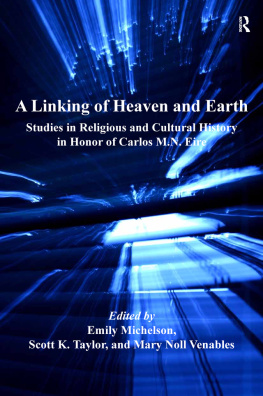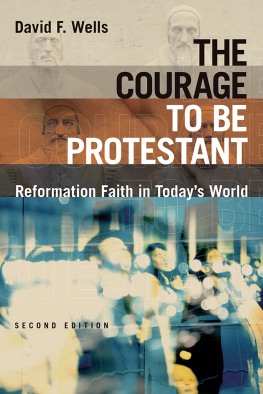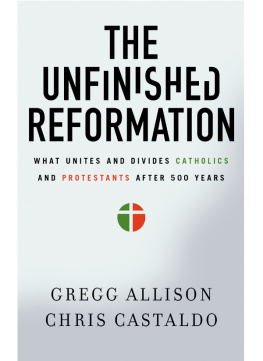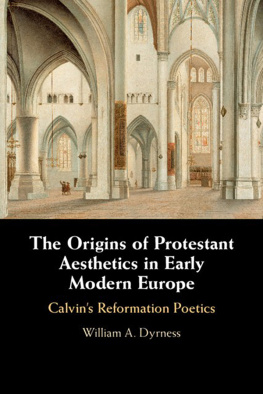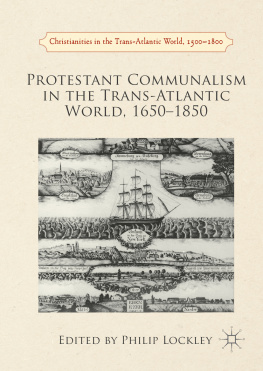Reformations
Reformations
The Early Modern World, 14501650
Carlos M. N. Eire
Yale UNIVERSITY PRESS
NEW HAVEN AND LONDON
Published with assistance from the Kingsley Trust Association Publication Fund established by the Scroll and Key Society of Yale College, from the Ronald and Betty Miller Turner Publication Fund, from the Frederick W. Hilles Publication Fund of Yale University, and from the foundation established in memory of Oliver Baty Cunningham of the Class of 1917, Yale College.
Copyright 2016 by Yale University.
All rights reserved.
This book may not be reproduced, in whole or in part, including illustrations, in any form (beyond that copying permitted by Sections 107 and 108 of the U.S. Copyright Law and except by reviewers for the public press), without written permission from the publishers.
Yale University Press books may be purchased in quantity for educational, business, or promotional use.
For information, please e-mail (U.K. office).
Set in Adobe Garamond by Newgen.
Printed in the United States of America.
Library of Congress Control Number: 2016933635
ISBN: 978-0-300-11192-7 (hardcover : alk. paper)
A catalogue record for this book is available from the British Library.
This paper meets the requirements of ANSI/NISO Z39.48-1992 (Permanence of Paper).
10 9 8 7 6 5 4 3 2 1
Contents
Preface
Sometimes, the course of history can change instantly, in the blink of an eye, and everyone notices. Sometimes, however, change is imperceptible. Either way, it is always left up to historians to argue about how, when, and why things changed, how much change took place, how long its effects lasted, what to call that span of time, and what significance should be attached to it.
Despite much wrangling, most historians have agreed for five centuries about when and where one such epochal shift took place. The time was late October 1517. The place was the University of Wittenberg in Saxony, a new and undistinguished school. The man involved was an obscure monk named Martin Luther. The event was a simple act of defiance: Luthers public questioning of widely accepted teachings concerning the forgiveness of sins. The era supposedly initiated then and there was called the Reformation.
Should so much change be ascribed to one person and one event?
Like many such turning points in history, the controversy sparked by this monk was long in coming. In fact, the way had been prepared for Martin Luther over several generations, by countless individuals and impersonal forces, and he was as much a product of change as an agent of it. What he didso to speakwas spark a colossal explosion with a powder keg not of his own making. The volatile elements were there already, everywhere, in plain view. Only an obtuse observer could have failed to notice their presence, for discontent and cries for reform were endemic. What no one could tell at the time, not even Luther, was how much of a punch those explosive elements really packed.
Luthers outburst in late October 1517 was couched in scholarly terms and ostensibly addressed to a learned audience. It should have caused only a few ripples, but instead it set off a chain reaction, much to everyones surprise, and the end result was a conflagration of epic proportions. History does not always follow a predictable path, especially when religion is involved. Nor are deviations in historys path easy to sum up. To say that Luther changed his world single-handedly or that 1517 was the absolute beginning of a new epoch would be wrong, but to say that nothing was ever the same after Luthers act of defiance is to settle for understatement. What he set in motion in 1517 not only changed the world as it was then; it still continues to shape our world today and to define who we are in the West.
What drove and defined this great transformation was religion. No doubt about it. But to assert this is also to acknowledge that religion played a different role in Western civilization back then than it does now. Religion was so deeply intertwined with all social, political, economic, and cultural structures as to be inseparable from nearly every aspect of daily life. Religious defiance, then, was much more than what we might call religious in our own day: it was, in fact, the most potent sort of defiance, for to redefine religion was to redefine the world.
This book deals with an epochal change, and with the role played in that change by religion. It is above all a narrative, a retelling of a story that has been told many times before, but that takes into account the latest findings of those who study this segment of the past, with an eye firmly fixed on present-day concerns. It also analyzes what occurred, and its significance for us five centuries later. One of its chief assumptions is that no Westerner can ever hope to know him- or herself, or the world he or she lives in, without first understanding this crucial turning point in history. And the same goes for any non-Westerner who wants to understand Western civilization. Naturally, this book also assumes that the ancient Greek aphorism know thyself is still valid, and a key to survival and continual progress in our increasingly amnesiac global village. Given that those who are ignorant of the past can be more easily fooled and controlled in the present by power-hungry ideologues, or by their own worst impulses, this book has been written with a sense of urgency.
This book also assumes that to understand this crucial period in Western history, one must take religion seriously as a real factor in human events, as something that gave shape to that age and to our own in ways that we now find difficult to imagine or comprehend. This is not to say that religion was some monolithic, isolated sphere of human activity back then, or that it could ever be the sole concern for any individual or society. Much less is it to say that religion is the most significant sphere of human activity, or that theology and beliefs are the sole lens through which to view this epochal shift. What is assumed in this book is something that nearly all experts on this period agree on: that religion permeated all of life, even though not everyone was equally religious or pious.
Religion was a language of sorts at the turn of the sixteenth century, a way of conceiving and of expressing, and a way of interacting with ones neighbors, near and far. It was also the very marrow of all social, economic, political, and cultural exchanges. Even the minutest details of daily life could be inseparable from religion, shaped by it to some extent, in various ways. Some sociologists and anthropologists speak of religion as a social glue, a cultural reality that binds society together. Religion was more than a social glue back then: because it linked everyone in every village and kingdom, it also allowed them to transcend seemingly insurmountable social, political, cultural, linguistic, and ethnic boundaries. From Portugal in the southwest to Lithuania in the northeast, and from Sicily in the far south to Scandinavia in the extreme north, a common set of myths, rituals, symbols, and ethical norms linked all Westerners, and so did one ancient and complex institution that mediated this religion: the Catholic Church, led by the pope in Rome. To break with this church was to turn it from an adhesive into an explosive, to change it into social dynamite.
The name for this transitional moment in history has changed over the years. In the English-speaking world, as in several other European cultures, this era came to be known as the Reformation. Implicit in this designation is the judgment that something corrupt had been reformed or improved. More than that, the singular capitalized name given to this historical period implied that this event was the ultimate, definitive step in the right direction: it was not a reformation, but
Next page

